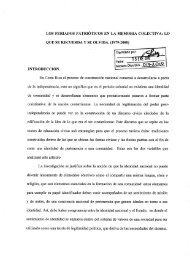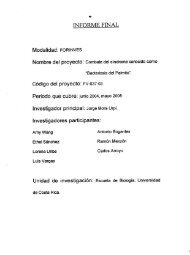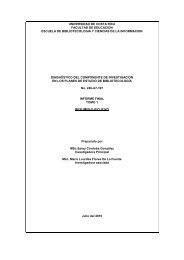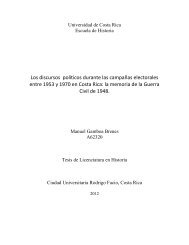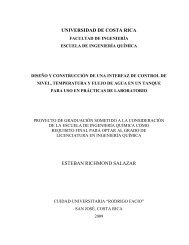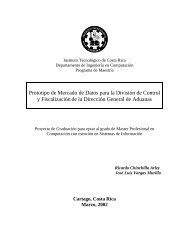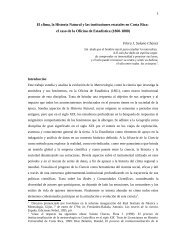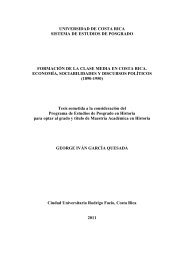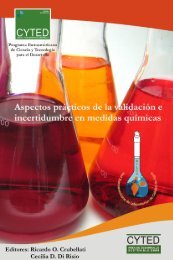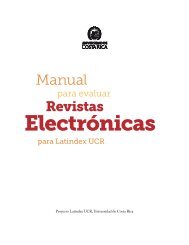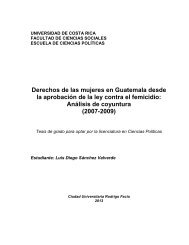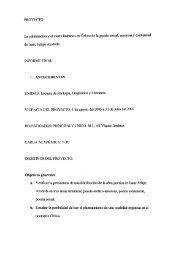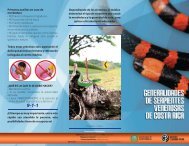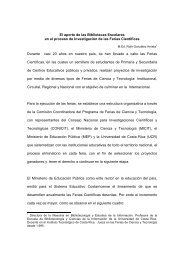A Raisin in the Sun
A Raisin in the Sun
A Raisin in the Sun
Create successful ePaper yourself
Turn your PDF publications into a flip-book with our unique Google optimized e-Paper software.
(Underbreath) Express herself!” (Hansberry, 1988: 48). Ruth is clearly mock<strong>in</strong>g Beneatha's efforts for selfexpression<br />
as an <strong>in</strong>dividual. For Ruth, Beneatha is simply wast<strong>in</strong>g her time and depicts her as utterly selfcentered.<br />
Clearly, Ruth's discourse may be attributed to patriarchy –Ruth has assimilated patriarchal<br />
premises and has become <strong>the</strong> voice of this oppressive system to keep Beneatha under control s<strong>in</strong>ce <strong>the</strong><br />
young woman represents a threat to Ruth's stability. Still, Ruth would have no reason to feel <strong>in</strong>timidated<br />
by Beneatha because no man is present <strong>in</strong> <strong>the</strong> house at <strong>the</strong> moment and Walter, <strong>the</strong> man <strong>in</strong> <strong>the</strong> family, is<br />
not viewed as a figure of power. In this light, one may trace Ruth's attacks as a way to legitimize her own<br />
power <strong>in</strong> front of Lena, Beneatha's mo<strong>the</strong>r. However, this is not <strong>the</strong> case, for Ruth makes remarks about<br />
Beneatha's behavior even when <strong>the</strong> two women are alone: “Bennie, why you always gotta be pick<strong>in</strong>' on<br />
your bro<strong>the</strong>r? Can't you be a little sweeter sometimes?” (Hansberry, 1988: 38).<br />
Although Ruth is not an educated woman, she does not feel belittled by <strong>the</strong> <strong>in</strong>tellectual level of<br />
Beneatha. In fact, Ruth does not treat her sister <strong>in</strong> law as a woman, for she usually refers to Beneatha as a<br />
“little girl” (Hansberry, 1988: 49). One could ascribe this particular use of language to Ruth's closeness<br />
with Beneatha, but <strong>the</strong> reality is that Beneatha is not a fully grown woman <strong>in</strong> Ruth's eyes: “You th<strong>in</strong>k you<br />
a woman, Bennie –but you still a little girl. What you did was childish– so you got treated like a child”<br />
(Hansberry, 1988: 52).<br />
Ruth's position of power above Beneatha is more evident when one analyzes what happens when<br />
Beneatha tries to <strong>in</strong>quire about Ruth's pregnancy. Ruth disda<strong>in</strong>s Beneatha's <strong>in</strong>sistence and pla<strong>in</strong>ly refuses<br />
to give her any <strong>in</strong>formation: “M<strong>in</strong>d your own bus<strong>in</strong>ess” (Hansberry, 1988: 58). By say<strong>in</strong>g <strong>the</strong>se words,<br />
Ruth reaffirms her position of power over her sister <strong>in</strong> law and excludes her from <strong>the</strong> circle of those with<br />
access to her private <strong>in</strong>formation. Although Ruth's refusal to provide <strong>in</strong>formation to Beneatha may seem a<br />
simple matter of embarrassment, its connection with power is disclosed <strong>in</strong> <strong>the</strong> light of Frye's l<strong>in</strong>k between<br />
power and <strong>in</strong>formation. Frye states that “<strong>the</strong> powerful normally determ<strong>in</strong>e what is said and sayable”<br />
(1983: 105). From this perspective, by deny<strong>in</strong>g <strong>in</strong>formation to Beneatha, Ruth is execut<strong>in</strong>g her power over<br />
her and plac<strong>in</strong>g her sister <strong>in</strong> law <strong>in</strong> <strong>the</strong> marg<strong>in</strong>. This emphasizes <strong>the</strong> idea that Ruth is not below Beneatha<br />
<strong>in</strong> terms of power.<br />
If Ruth is not below Beneatha and appears to be above her, her power relation with Lena becomes<br />
an important issue for analysis as well. Traditional, b<strong>in</strong>ary-opposition based perspectives would conclude<br />
that Ruth necessarily aligns below Lena. S<strong>in</strong>ce Lena is older than Ruth, Ruth's age-related power becomes<br />
<strong>in</strong>effective. Similarly, if age means experience, Lena is much more experienced than Ruth is and makes <strong>the</strong><br />
decisions <strong>in</strong> <strong>the</strong> family. Ruth, however, is empowered enough to defy Lena. This is evident when Ruth<br />
Saravia Vargas, José Roberto. "From Power-over to Power-to: Power Relations of Women <strong>in</strong> Hansberry's A <strong>Rais<strong>in</strong></strong> <strong>in</strong> <strong>the</strong> <strong>Sun</strong>"<br />
Impossibilia Nº4, Págs. 34-51 (Octubre 2012) Artículo: Recibido 08/02/2012 - Aceptado 20/03/2012 - Publicado 30/10/2012<br />
44



